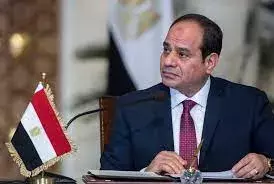Al-Sissi warns against displacing Gazans to Egypt
The Israeli bombardment came after hundreds of Islamist militants crossed the border from Gaza into Israel in a surprise attack on Oct. 7, that targeted civilian communities and a music festival.;

Egyptian President Abdel-Fatah al-Sissi on Wednesday warned against the repercussions of forcibly displacing Palestinians from the neighbouring Gaza Strip, now the focus of a massive Israel bombardment.
Worries have grown in Egypt, the first Arab country to sign a peace treaty with Israel in 1979, about a mass exodus into Egypt’s Sinai Peninsula after the Israeli military told people in the north of Gaza to head south as an Israeli ground offensive looms.
Egypt’s Rafah, the only border crossing into the Gaza Strip that is not controlled by Israel, is currently closed, although pressure is building on Egypt and Israel to reopen it, at least for aid deliveries.
Al-Sissi at a joint press conference with German Chancellor Olaf Scholz said “Egypt rejects attempts to liquidate the Palestinian cause by military means or displacement.
“`The idea of forcibly displacing the Gaza people to Egypt and the people of the West Bank to Jordan is not feasible and we warn of the risks involved.
“If there is an idea of expelling Palestinians, then there is the Negev desert [in Israel],” he suggested.
The Israeli bombardment came after hundreds of Islamist militants crossed the border from Gaza into Israel in a surprise attack on Oct. 7, that targeted civilian communities and a music festival.
Israel has also imposed a tight blockade on Gaza and stopped the entry of food, fuel and medicines to Gaza, prompting dire warnings about the conditions faced by civilians in the impoverished territory.
“`The all-out blockade on the Gaza Strip and refusal to allow aid into the enclave aims eventually to transfer the Palestinians to Egypt.
We reject the liquidation of the Palestinian cause and displacement to Sinai,” al-Sissi said at the press conference.
He also warned that ongoing military operations would have “military and humanitarian repercussions” that could spiral out of control and push the region into a cycle of violence.

